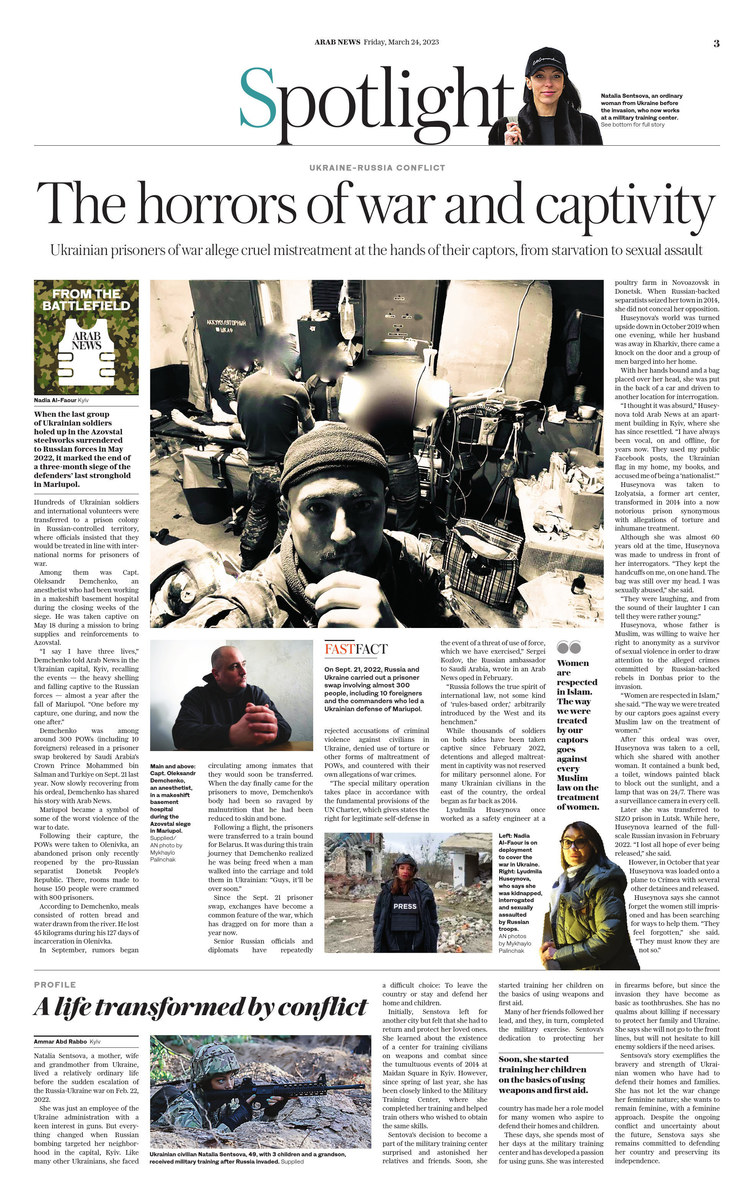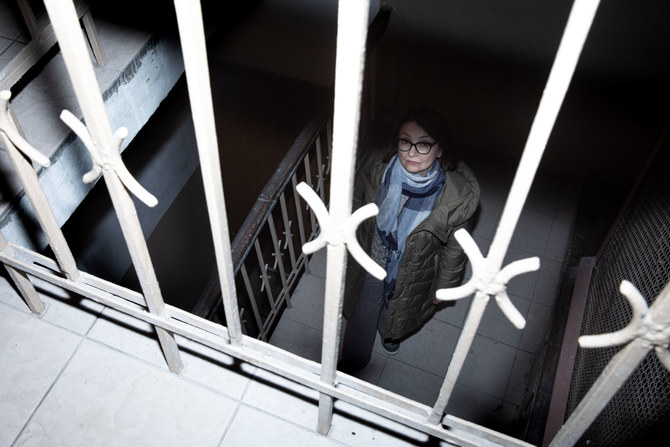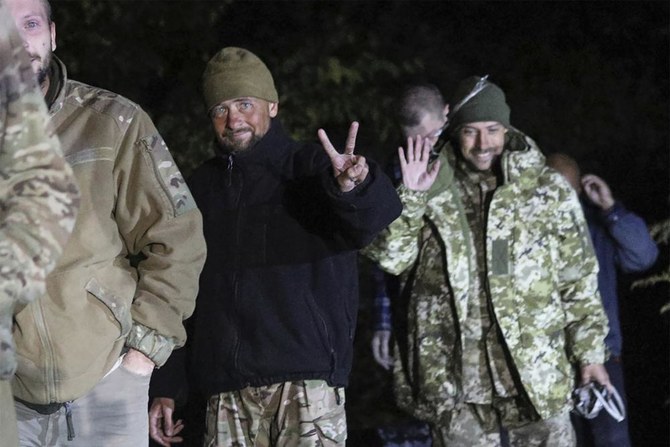KYIV: When the last group of Ukrainian soldiers holed up in the Azovstal steelworks surrendered to Russian forces in May 2022, it marked the end of a ferocious three-month siege of the defenders’ last stronghold in Mariupol.
Hundreds of Ukrainian soldiers and international volunteers were transferred to a prison colony in Russian-controlled territory, where officials insisted that they would be treated in line with international norms for prisoners of war.
Among them was Capt. Oleksandr Demchenko, an anesthetist who had been working in a makeshift basement hospital during the closing weeks of the siege. He was taken captive on May 18 during a mission to bring supplies and reinforcements to Azovstal.
“I say I have three lives,” Demchenko told Arab News in the Ukrainian capital, Kyiv, recalling the events — the heavy shelling and falling captive to the Russian forces — almost a year after the fall of Mariupol. “One before my capture, one during, and now the one after.”
Demchenko was among around 300 POWs (including 10 foreigners) released in a prisoner swap brokered by Saudi Arabia’s Crown Prince Mohammed bin Salman and Turkiye on Sept. 21 last year. Now slowly recovering from his ordeal, Demchenko has shared his story with Arab News.
Mariupol became a symbol of some of the worst violence of the war to date. Moscow recognized the coastal city’s strategic importance as a stepping stone in building a land bridge from Russia to Crimea, annexed by Moscow in 2014.
The Azovstal steelworks, covering an area of about 4 square miles, including a warren of underground tunnels, became a final holdout where thousands of Ukrainian and Russian soldiers perished in some of the most brutal urban warfare of the past century.
From his underground field hospital, Demchenko operated on wounded soldiers until the Russian onslaught finally overran Ukrainian positions. “They were throwing everything they had at us,” he said.
By that point, the Ukrainian defenders were running low on food, ammunition and medicine. “If I had half a cup of water, I’d call it a good day,” said Demchenko, recalling the privation of those final days in Azovstal.
Following their capture, the POWs were taken to Olenivka, an abandoned prison only recently reopened by the pro-Russian separatist Donetsk People’s Republic. There, rooms made to house 150 people were crammed with 800 prisoners.
RELATED
Chronicle of a Ukrainian woman’s journey from administration to military training
According to Demchenko, meals consisted of rotten bread and water drawn from the river. He lost 45 kilograms during his 127 days of incarceration in Olenivka, where prisoners were watched and interrogated by a rotating contingent of guards.
Demchenko said he spent his first month and a half in the prison asleep out of sheer exhaustion from the last stand at Azovstal.
“I kept my mind going, I kept making plans for the future,” he said. “My mental state was fine, but I was starting to worry that my body wouldn’t survive for long.”
Several former inmates of Olenivka, officially known as Correctional Colony No. 120, have detailed allegations of beatings, torture, forced labor, and the denial of food and medical care.
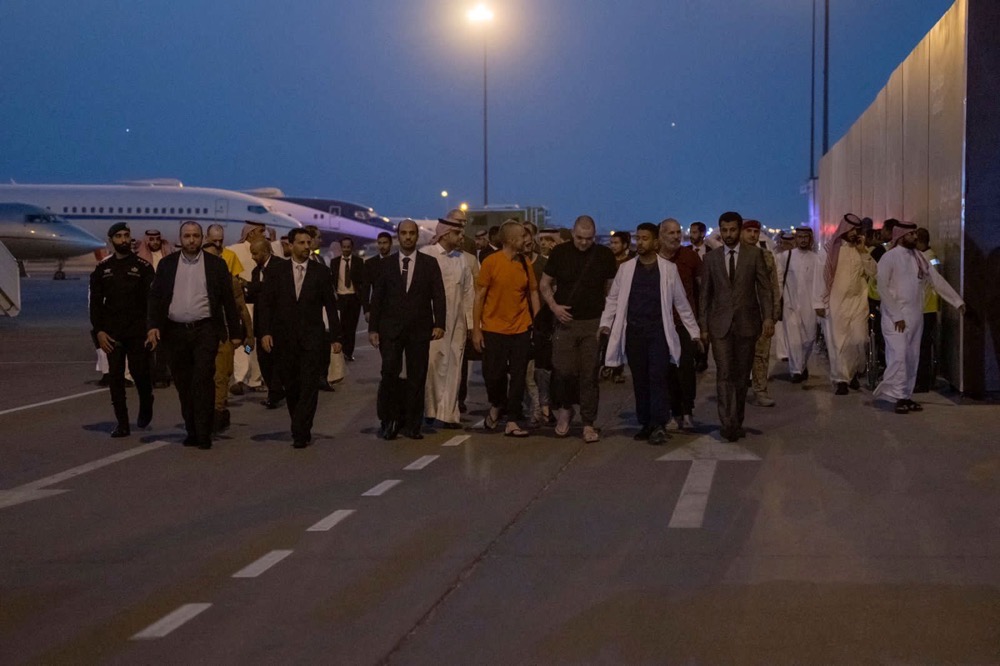
Prisoners of war (five British citizens, one Moroccan, one Swede, one Croat, and two Americans) are seen in the tarmac after arriving, following successful mediation efforts by Saudi Arabia's Crown Prince Mohammed bin Salman, from Russia to King Khalid International Airport, in Riyadh, Saudi Arabia, September 21, 2022. (SPA)
On July 29, the prison became notorious when more than 50 Ukrainian POWs were reportedly killed in a blast that both Russia and Ukraine accuse the other of carrying out, with many of the inmates burning to death.
Russia claimed Ukraine had fired US-supplied HIMARS rockets at the prison to deliberately kill its own POWs. Ukraine denied Russia’s claims, accusing Moscow of carrying out the killings to cover up its maltreatment of prisoners.
An independent inquiry is yet to take place.
In September, rumors began circulating among inmates that they would soon be transferred. When the day finally came for the prisoners to move, Demchenko’s body had been so ravaged by malnutrition that he had been reduced to skin and bone.
Following a flight, the prisoners were transferred to a train bound for Belarus. It was during this train journey that Demchenko realized he was being freed when a man walked into the carriage and told them in Ukrainian: “Guys, it’ll be over soon.”
Upon his release, Demchenko said he immediately called his family. Instead of saying hello he greeted them with the wartime salutation: “‘Slava Ukraini’ — ‘Glory to Ukraine.’
“They asked: ‘Who is this?’” said Demchenko. “I laughed and told them: ‘Have you forgotten me so soon?’”
Since the Sept. 21 prisoner swap, exchanges have become a common feature of the war, which has dragged on for more than a year now. Some 1,863 women and men have been released since Russia launched what it called a “special military operation” on Feb. 24, 2022.
Thousands, however, remain imprisoned in conditions said to be at odds with international humanitarian law, including the Third Geneva Convention on the treatment of POWs adopted in August 1949.
According to the convention, POWs must at all times be humanely treated. Any unlawful act or omission by the detaining power causing death or seriously endangering the health of a POW in its custody is prohibited, and, if it occurs, is regarded as a serious breach of the convention.
FASTFACTS
• On Sept. 21, 2022, Russia and Ukraine carried out a prisoner swap involving almost 300 people, including 10 foreigners and the commanders who led a Ukrainian defense of Mariupol.
• The swap, which involved help from Saudi Arabia and Turkiye, resulted in the release of 215 Ukrainians, most of whom were captured after the fall of Mariupol.
• The freed Ukrainians included Lt. Col. Denys Prokopenko, commander of the Azov battalion; his deputy, Svyatoslav Palamar; and Serhiy Volynsky, the commander of the 36th Marine Brigade.
The convention also obliges all parties to an international armed conflict to grant the International Committee of the Red Cross access to all prisoners of war and the right to visit them wherever they are held. Russia and Ukraine are both parties to the treaty.
Senior Russian officials and diplomats have repeatedly rejected accusations of criminal violence against civilians in Ukraine, denied use of torture or other forms of maltreatment of POWs, and countered with their own allegations of war crimes.
“The special military operation takes place in accordance with the fundamental provisions of the UN Charter, which gives states the right for legitimate self-defense in the event of a threat of use of force, which we have exercised,” Sergei Kozlov, the Russian ambassador to Saudi Arabia, wrote in an Arab News oped in February.
“As you can see, Russia follows the true spirit of international law, not some kind of ‘rules-based order,’ arbitrarily introduced by the West and its henchmen.”
While thousands of soldiers on both sides have been taken captive since February 2022, detentions and alleged maltreatment in captivity was not reserved for military personnel alone. For many Ukrainian civilians in the east of the country, the ordeal began as far back as 2014.

Lyudmila Huseynova once worked as a safety engineer at a poultry farm in Novoazovsk in Donetsk. When Russian-backed separatists seized her town in 2014, she did not conceal her opposition.
Furthermore, Huseynova became heavily involved in helping to resettle families displaced by the fighting and took care of children in local orphanages.
“I saw the state of the children. They were starving,” Huseynova told Arab News at an apartment building in Kyiv, where she has since resettled.
“At the time there was no allocation of funds in the budget to help them as the budget was strained. I couldn’t fathom leaving them behind, so I stayed.”
Huseynova’s world was turned upside down in October 2019 when one evening, while her husband was away in Kharkiv, there came a knock on the door and a group of men barged into her home.
“I kept thinking why they were muddying the house I had just cleaned with their dirty boots,” said Huseynova.
With her hands bound and a bag placed over her head, she was put in the back of a car and driven to another location for interrogation.
“I thought it was absurd,” she said, recalling her abduction. “I have always been vocal, on and offline, for years now. They used my public Facebook posts, the Ukrainian flag in my home, my books, and accused me of being a ‘nationalist.’”
Huseynova was taken to Izolyatsia, a former art center, transformed in 2014 into a now notorious prison synonymous with allegations of torture and inhumane treatment. “The moment you enter Izolyatsia, you are oppressed as a human and as a woman,” she said.
Although she was almost 60 years old at the time, Huseynova was made to undress in front of her interrogators. “They kept the handcuffs on me, on one hand. The bag was still over my head. I was sexually abused,” she told Arab News.
“They were laughing, and from the sound of their laughter I can tell they were rather young.”

Lyudmila Huseynova, who says she was kidnapped, interrogated and sexually assaulted by Russian troops. (AN photo/Mykhaylo Palinchak)
Huseynova, whose father is Muslim, was willing to waive her right to anonymity as a survivor of sexual violence in order to draw attention to the alleged crimes committed by Russian-backed rebels in Donbas prior to the invasion.
“Women are respected in Islam,” she said. “The way we were treated by our captors goes against every Muslim law on the treatment of women.”
After this ordeal was over, Huseynova was taken to a cell, which she shared with another woman. It contained a bunk bed, a toilet, windows painted black to block out the sunlight, and a lamp that was on 24/7. There was a surveillance camera in every cell.
Huseynova said prisoners were made to stand every day from the early morning until sundown and were subjected to routine humiliation. On one occasion, Huseynova said she was forced to eat wheat containing mouse excrement, much to the joy of her captors.
Later Huseynova was transferred to SIZO prison in Lutsk, where she said she was deprived of sleep. “There were lots of addicts,” she said. “The TV was on at all hours of the day.”
It was while incarcerated in SIZO that Huseynova learned of the full-scale Russian invasion in February 2022. “I lost all hope of ever being released,” she said.
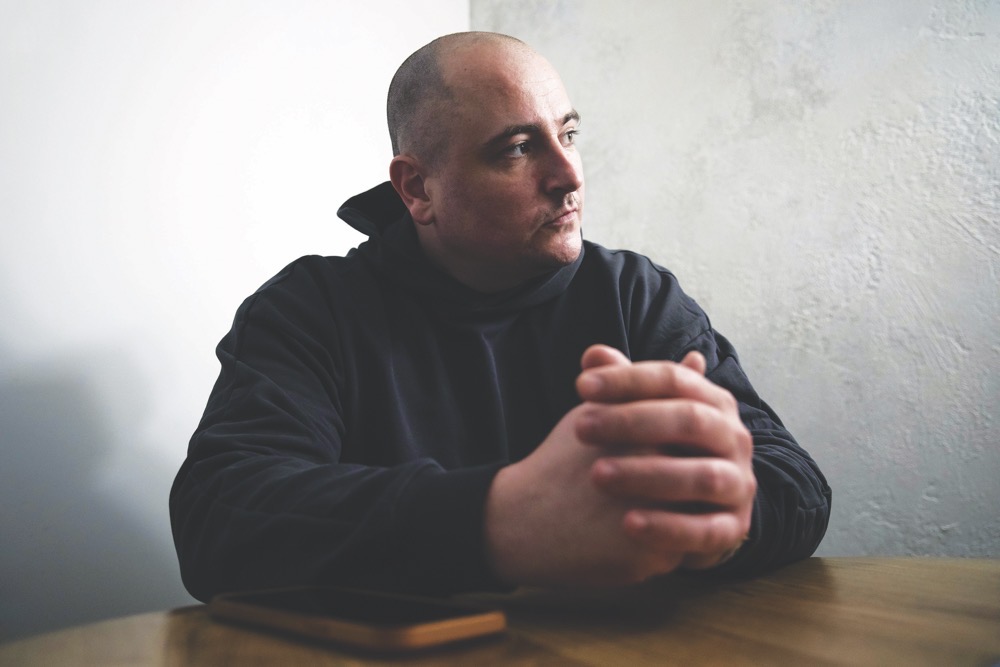
Capt. Oleksandr Demchenko. (AN photo/Mykhaylo Palinchak)
However, in October that year Huseynova was suddenly released. Rounded up with a group of other detainees, with tape placed over their eyes, she was transported by car, first to a basement cell, and then to a military airport.
“The car drove around for 7 hours almost aimlessly. When they put us in the basement, they told us we would be executed. We were given no food, no water, just one scoop of wheat.”
However, rather than killing the prisoners, their captors loaded the women onto a plane, cramming them into their seats. Huseynova said the women were told menacingly “don’t be afraid, but this will hurt a little.”
The plane then landed in Crimea, where Huseynova could see a man standing with a white flag waiting to greet them.
Months after her release and resettlement in Kyiv, Huseynova said she cannot forget the women still imprisoned and has been searching for ways to help them. “They feel forgotten,” she said. “They must know they are not so.”
Like Huseynova, Demchenko is still suffering from several health complications brought on by his captivity. He has, however, regained the weight he lost and is looking much healthier.
“Life goes on,” he said, reflecting on the past year of war, imprisonment and freedom. “I never regretted being part of the mission. Speaking as a doctor, Russia is a cancer that must be removed without anesthesia.
“The captors knew what they were doing and, even worse, they enjoyed what they were doing. I will continue my service. I will not stop until we win.”
The UN Office of the High Commissioner for Human Rights has accused both Russia and Ukraine of torturing prisoners of war during the conflict. The International Criminal Court is investigating war crimes and crimes against humanity in Ukraine going back as far as 2013. Its chief prosecutor, Karim Khan, believes there is a reasonable basis to believe war crimes have been carried out and, in December 2022, said “Ukraine is a crime scene.”
